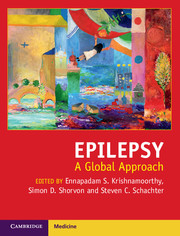40 results
Contributors
-
- Book:
- Epilepsy
- Published online:
- 13 April 2017
- Print publication:
- 06 April 2017, pp xi-xii
-
- Chapter
- Export citation
1 - Epilepsy
- from Section 1 - Editorial Introduction
-
-
- Book:
- Epilepsy
- Published online:
- 13 April 2017
- Print publication:
- 06 April 2017, pp 1-4
-
- Chapter
- Export citation
19 - Integrated Thoughts
- from Section 4 - Comprehensive Epilepsy Care
-
-
- Book:
- Epilepsy
- Published online:
- 13 April 2017
- Print publication:
- 06 April 2017, pp 86-86
-
- Chapter
- Export citation
Section 6 - The Surgical Management of Epilepsy
-
- Book:
- Epilepsy
- Published online:
- 13 April 2017
- Print publication:
- 06 April 2017, pp 118-146
-
- Chapter
- Export citation
Section 2 - Infective Causes of Epilepsy
-
- Book:
- Epilepsy
- Published online:
- 13 April 2017
- Print publication:
- 06 April 2017, pp 5-31
-
- Chapter
- Export citation
Dedication
-
- Book:
- Epilepsy
- Published online:
- 13 April 2017
- Print publication:
- 06 April 2017, pp iv-vi
-
- Chapter
- Export citation
Acknowledgments
-
- Book:
- Epilepsy
- Published online:
- 13 April 2017
- Print publication:
- 06 April 2017, pp xiii-xiv
-
- Chapter
- Export citation

Epilepsy
- A Global Approach
-
- Published online:
- 13 April 2017
- Print publication:
- 06 April 2017
14 - Integrated Thoughts
- from Section 3 - Consequences of Epilepsy
-
-
- Book:
- Epilepsy
- Published online:
- 13 April 2017
- Print publication:
- 06 April 2017, pp 65-66
-
- Chapter
- Export citation
6 - Integrated Thoughts
- from Section 2 - Infective Causes of Epilepsy
-
-
- Book:
- Epilepsy
- Published online:
- 13 April 2017
- Print publication:
- 06 April 2017, pp 30-31
-
- Chapter
- Export citation
Copyright page
-
- Book:
- Epilepsy
- Published online:
- 13 April 2017
- Print publication:
- 06 April 2017, pp iv-iii
-
- Chapter
- Export citation
7 - Physical Consequences of Epilepsy
- from Section 3 - Consequences of Epilepsy
-
-
- Book:
- Epilepsy
- Published online:
- 13 April 2017
- Print publication:
- 06 April 2017, pp 32-36
-
- Chapter
- Export citation
Contents
-
- Book:
- Epilepsy
- Published online:
- 13 April 2017
- Print publication:
- 06 April 2017, pp vii-x
-
- Chapter
- Export citation
Section 4 - Comprehensive Epilepsy Care
-
- Book:
- Epilepsy
- Published online:
- 13 April 2017
- Print publication:
- 06 April 2017, pp 67-86
-
- Chapter
- Export citation
Section 7 - Non-Pharmacologic Management of Epilepsy
-
- Book:
- Epilepsy
- Published online:
- 13 April 2017
- Print publication:
- 06 April 2017, pp 147-174
-
- Chapter
- Export citation
Section 3 - Consequences of Epilepsy
-
- Book:
- Epilepsy
- Published online:
- 13 April 2017
- Print publication:
- 06 April 2017, pp 32-66
-
- Chapter
- Export citation
Section 8 - Epilepsy Issues with Global Health Impact
-
- Book:
- Epilepsy
- Published online:
- 13 April 2017
- Print publication:
- 06 April 2017, pp 175-200
-
- Chapter
- Export citation
Section 5 - The Medical Management of Epilepsy
-
- Book:
- Epilepsy
- Published online:
- 13 April 2017
- Print publication:
- 06 April 2017, pp 87-117
-
- Chapter
- Export citation
17 - Comprehensive Epilepsy Care
- from Section 4 - Comprehensive Epilepsy Care
-
-
- Book:
- Epilepsy
- Published online:
- 13 April 2017
- Print publication:
- 06 April 2017, pp 77-82
-
- Chapter
- Export citation
9 - Neuropsychiatric Consequences of Epilepsy
- from Section 3 - Consequences of Epilepsy
-
-
- Book:
- Epilepsy
- Published online:
- 13 April 2017
- Print publication:
- 06 April 2017, pp 41-49
-
- Chapter
- Export citation



